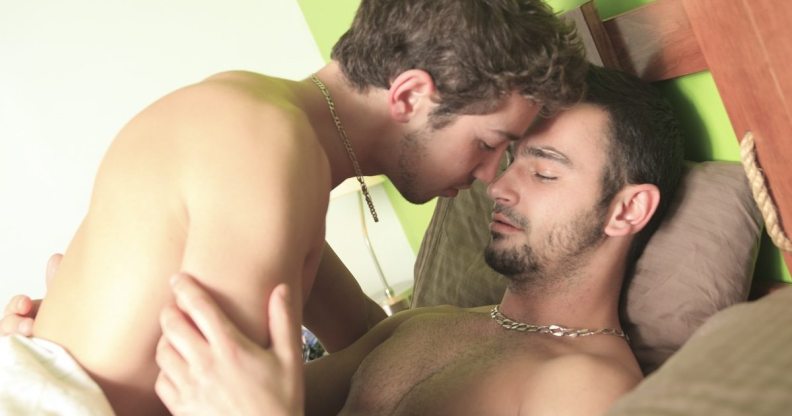What is bareback sex and what do I need to know about it?

If you ride a horse bareback, you’re going at it without a saddle.
Likewise, if you ride a man or a woman bareback, you’re going at it without a condom.
So, bareback sex is sexual penetration without the use of a condom. It’s a slang term which comes from the equestrian meaning of bareback – riding a horse without a saddle, as mentioned above.
Bareback sex has been considered more risky because condoms protect against STIs and HIV transmission.
If you are able to get pregnant, you’re more likely to end up with child, too.
But a lot of people prefer bareback sex, particularly in monogamous relationships or through use of regular STI screening, serosorting and protective measures such as PrEP drugs.
One risk comes from people not knowing their HIV status, or from not having regular STI screening.
1 out of 7 people who have HIV are unaware of their HIV-positive status.
But many enjoy sex without condoms regularly and find it is possible to protect themselves.
Why do people enjoy bareback sex?
Lots of people prefer bareback, saying it feels better, is more enjoyable and preferable to sex with condoms.
While, as with all sex, it is important to be aware of the risks involved, lots of people find it preferable, even in serodiscordant pairings.
Lots of couples, whether both HIV-negative, serodiscordant or HIV-positive, have regular bareback sex. Those not in monogamous relationships also practice bareback, by sero-sorting their partners.
What are the risks of bareback?
Anal sex does carry a higher risk of transmission of STIs than other types of sexual contact because the lining of the anus is thin and can easily be damaged, which makes it more vulnerable to infection.
Obviously, using condoms helps protect against STIs when you have anal sex, but if you decide to try bareback, it is worth being aware of the risks involved.
HIV-positive people on medication with undetectable viral loads can practice bareback sex as it is virtually impossible to transmit HIV. In some ways it can be safer for a negative guy to do bareback with an HIV-positive guy with an undetectable viral load.
But it is worth bearing in mind that while sero-sorting and PrEP can protect against HIV-transmission, by practicing bareback, it is possible to put yourself at risk of STIs like hepatitis, chlamydia, warts and gonorrhoea.
What if both people having bareback sex are HIV negative?
If both people are HIV-negative, and regularly test for STIs and HIV, it is possible to enjoy bareback sex with few risks.
But it is worth bearing in mind that even if someone thinks they are HIV-negative it may not be the case, depending on what has happened since their last test. This is worth keeping in mind if deciding to have bareback sex.
The best thing to do is talk openly about sex and screening, and ensure you trust what the person you are hooking up with says.
How many men have bareback sex?
A recent survey revealed the number of gay and bi guys having sex without a condom.
According to FS, the magazine of sexual health charity GMFA, almost two in three men who have sex with men are doing it bareback.
The investigation also found that 32% of men did not know if their sexual partner was HIV-negative before having sex.
65% of respondents said that they did not use condoms the last time they had anal sex – with just 8% saying they or their partner were on HIV-prevention drug PrEP.
11% of men who took part said they have bareback sex and did not worry about the risk, while 27% of respondents admitted to having a “risky sex life”.
14% of the 523 men surveyed said they had had bareback sex with someone who is HIV-positive with an undetectable viral load.
What you can do to protect yourself from HIV infection while having bareback sex?
If you feel you may have put yourself at risk of HIV or STI transmission, there are things you can do to protect yourself.
PEP (POST-exposure prophylaxis): If you’ve been barebacking, you could consider using PEP.
Available at sexual halth clinics and A&E in the UK, the month-long course of drugs has proven highly effective in stopping HIV transmission.
If you think you need PEP, go to your local A&E or walk-in sexual health clinic within 72 hours of the sexual encounter. Any longer, and it will no longer be effective.
RELATED: Explained: What is PrEP and where can I get it?
PrEP (PRE-exposure prophylaxis): The pill Truvada (one of the pills in PEP, actually), is a highly effective treatment in the prevention of getting HIV.
For those of you in the UK, it’s not yet available on the NHS, apart from in Scotland. But it a trial is rolling out in England after launching a few weeks ago, and will soon be available in Wales (sorry Northern Ireland). In the US, you’ll have to check with your health provider.
This article has been updated

